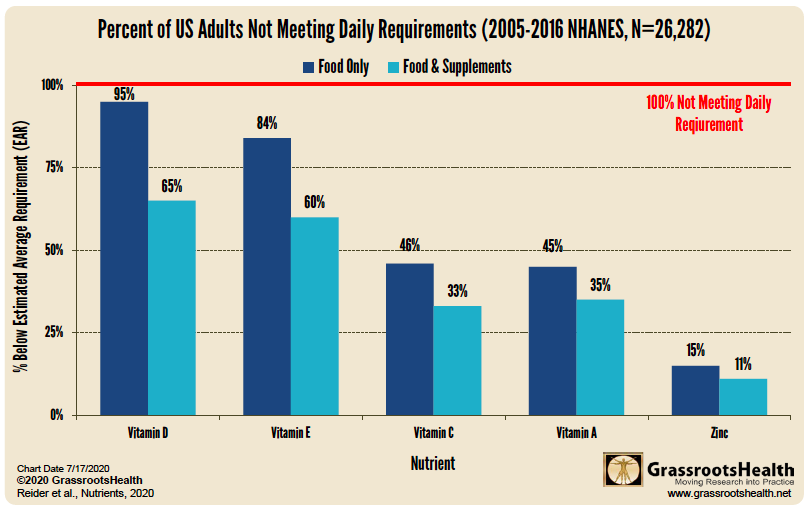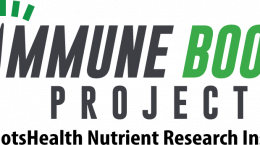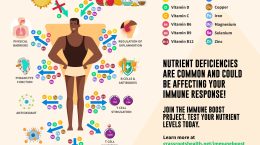Published on August 31, 2020
Those who follow GrassrootsHealth should be well aware that
- Up to 75% of the world’s population is vitamin D deficient; 35% or more of all healthcare costs could be saved if the population achieved the 40-60 ng/ml (100-150 nmol/L) recommended range
- More than 80% are deficient in omega-3 fatty acids (below the recommended 8%)
- Over 45% of the US population are very likely deficient in magnesium
But that’s not all… 46% of us do not get enough Vitamin C, 35% have inadequate vitamin A intakes, a whopping 84% do not get enough Vitamin E and 15% are inadequate for zinc, all of which are necessary for a healthy immune response.
Don’t Let a Nutrient Deficiency Get You “Down”!
NHANES is the National Health and Nutrition Examination Survey, a program run by the Centers for Disease Control (CDC) to assess health and nutrition status of individuals in the United States. A recent review by Reider et al. analyzed the latest set of NHANES data to get a better idea of nutrient intake. Specifically, they looked at Vitamins A, C, D, E and zinc due to their well-known roles in immune function.
 The chart above shows the inadequate intakes are for each nutrient, based on intake from food alone and from food plus dietary supplements. While supplements do help bridge the gap for some, many are still left with inadequate intake of several key nutrients.
The chart above shows the inadequate intakes are for each nutrient, based on intake from food alone and from food plus dietary supplements. While supplements do help bridge the gap for some, many are still left with inadequate intake of several key nutrients.
Another finding from this review was the discovery that intakes of certain nutrients, such as vitamin C, vitamin D, and zinc, are lower than expected from previous reports. The likelihood of being deficient in one or multiple immune boosting nutrients is quite high and even more of a reason to test your levels of vitamin D and zinc to make sure your diet and supplemental intake are helping you achieve adequate levels. These are two of the nutrients tested for in our new Immune Boost test kit.
Nutrients Support Healthy Immune Function
We have previously shared about how Vitamin D is necessary for healthy immune function, especially in response to infection (such as COVID-19), as well as for many other health outcomes. Other nutrients, such as vitamin C and zinc, also work to support the immune response. One study on supplementation with vitamin D, magnesium and vitamin B12 resulted in improved outcomes for individuals with COVID-19. These are just a handful of the nutrients that have an effect on immune system function.
Based on what is known about these nutrients and their roles in immune function, the authors concluded:
“Micronutrients are a fundamental part of the immune system and require optimal levels for effective immune function. Nutrient insufficiency/deficiency of one nutrient can adversely affect immune health, while multiple inadequacies may put the immune system at a bigger deficit.”
Avoid Deficiency – Enroll in the GrassrootsHealth Nutrient Research Immune Boost Project and Test Today
Do you know your own nutrient levels? Do you know your levels of inflammation? Could getting more of certain nutrients help to decrease your levels of inflammation, and improve your immune response? Find out by testing your vitamin D, omega-3s, magnesium and other essential elements (including copper and zinc), as well as your inflammation levels, with the new Immune Boost home test kit offered by GrassrootsHealth. Measuring levels is the only way to know if you are supporting your immune system and whether additional changes should be made, with supplementation, dietary changes, or both.
Are You Getting Enough Vitamin D to Help Yourself?
We’re in a time of great crisis that could be greatly affected by making sure you and everyone you know has a serum level of at least 40 ng/ml. Help us help you.
Do you know what your vitamin D level is? Be sure to test today to find out, and take steps to keep it within a target of 40-60 ng/ml or 100-150 nmol/L! Give your immune system the nutrients it needs to support a healthy you and protect yourself from unnecessary diseases, especially COVID-19.
GrassrootsHealth Nutrient Research Institute has launched the Immune Boost project with the use of our myData-myAnswers nutrient health system that over 15,000 people are already using for their health. Specific markers that influence immune health are suggested for testing as part of this project including:
- Vitamin D
- Omega-3 Index
- Essential elements magnesium, selenium, and zinc
- hsCRP
Through GrassrootsHealth Nutrient Research Institute, you can also test your essential elements magnesium, copper, zinc and selenium, toxins such as lead, mercury and cadmium, as well as your omega-3 levels, inflammation levels and thyroid stimulating hormone (TSH) level. Find out your levels today! Log on to the test selection page (click the link below) to get your tests and see for yourself if your levels can be improved.
Make sure you track your results before and after, about every 6 months!
How can I track my nutrient intake and levels over time?
To help you track your supplement use and nutrient levels, GrassrootsHealth has created the Personal Health Nutrient Decision System called
For each specific supplement, you can track what days you take it, how much, and many other details. This will help you know your true supplemental intake and what patterns of use work for you to reach and maintain optimum nutrient levels. Check it out today!









